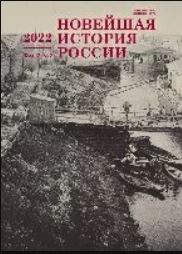Слабые секретари: региональные руководители СССР 1946–1948 гг. в оценках ЦК ВКП(б)
Weak Secretaries: How the Central Committee Assessed the Professionalism of Soviet Regional Leaders in 1946-1948
Author(s): A. N. FеdorovSubject(s): Politics, Political history, Government/Political systems, Post-War period (1950 - 1989)
Published by: Издательство Исторического факультета СПбГУ
Keywords: Central Committee of the CPSU(b); personnel; first secretaries; party committees; party organs; regional leadership; post-war period; late Stalinism;
Summary/Abstract: The article explores the reasons, course, and results of studying the professional qualities of the first secretaries of regional party committees in 1946–1948. This survey was prompted by the desire of the Soviet top leadership in the first post-war years to improve regional leadership and thereby increase the efficiency of the management system. For this purpose, the Cadres department of the Central Committee of the AUCP(b) compiled special characteristics for the first secretaries of obkom, kraikom and republican committees, which included an assessment of their organizational skills and career prospects. The assessment of these leaders was not based on the usual formal criteria (education level, political training and work experience), but according to the fulfillment of the center’s tasks, leadership style and authority among local managers. In the opinion of the Central Committee, the ability to establish work of the party apparatus and normal relations with local managers allowed regional leaders to cope with their duties. Despite the weak analysis of the data, vague assessment criteria and their arbitrary application, softening and correcting the estimates, disappointing results were obtained. It turned out that many of the first secretaries of regional party committees did not have elementary managerial skills, practiced a dictatorial leadership style, and chronically failed to perform economic tasks. Based on this, it was necessary to replace half of the regional leaders, but Cadres department of the Central Committee proposed to dismiss only 10% of the first secretaries and keep at work another 20% due to short-term retraining. Nevertheless, in 1946–1948, even such modest plans could not be implemented due to the lack of a cadre reserve, and therefore the renewal of the corps of regional leaders was delayed until the early 1950s.
Journal: Новейшая история России
- Issue Year: 12/2022
- Issue No: 39
- Page Range: 416-436
- Page Count: 21
- Language: Russian

